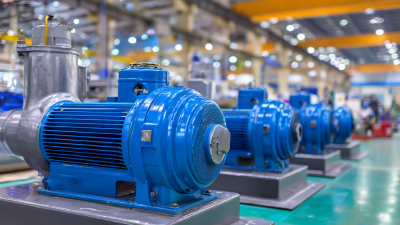Understanding the Importance of Proper Maintenance for Your Diesel Fuel Tank
Maintaining a diesel fuel tank is crucial for ensuring its longevity and efficiency, as improper maintenance can lead to costly repairs and safety hazards. According to a report by the National Association of Fleet Administrators, approximately 70% of diesel-related issues stem from inadequate tank maintenance practices, which can result in contamination and corrosion. Additionally, the Environmental Protection Agency estimates that poorly maintained diesel tanks can contribute to significant fuel spills, costing the industry millions in cleanup efforts. With diesel engines being a primary power source for many sectors—including transportation, agriculture, and construction—understanding the importance of proper maintenance for your diesel fuel tank is not only critical for optimal performance but also for environmental responsibility. This guide will provide essential insights and practical steps for maintaining a diesel fuel tank effectively, helping to minimize risks and maximize efficiency.

Key Steps for Regular Inspection of Diesel Fuel Tanks
Proper maintenance of diesel fuel tanks is crucial for ensuring both the safety and efficiency of fuel storage systems. Regular inspections can identify potential issues before they escalate into costly problems or environmental hazards. According to industry standards, such as those outlined in API 653, maintaining mechanical integrity is vital for safeguarding personnel and the environment. This includes conducting visual inspections, checking for leaks, and monitoring signs of corrosion.

Tips for performing regular inspections include establishing a routine schedule that adheres to regulatory compliance guidelines. It is recommended to document all findings and remedial actions taken during inspections. Utilize specialized cleaning products designed for fuel tank maintenance to keep the internal surfaces free from contaminants, which can degrade fuel quality and lead to system failures.
Moreover, adopting the practice of conducting environmental risk assessments can further prevent potential damages associated with diesel fuel leaks. A case study highlighted by environmental protection agencies emphasizes the significance of proactive assessments, showing that early detection of leaks not only protects the environment but also reduces expensive cleanup costs. By prioritizing proper maintenance and inspection, operators can improve the longevity and reliability of their diesel fuel tanks.
Essential Cleaning Techniques to Maintain Diesel Fuel Quality
Proper maintenance of diesel fuel tanks is crucial for ensuring the longevity and performance of diesel fuel. Essential cleaning techniques play a significant role in maintaining fuel quality. According to the National Renewable Energy Laboratory, around
85% of diesel fuel issues stem from contamination, which can lead to poor engine performance and increased operational costs. Regular inspections and cleaning can help mitigate these risks.
One effective cleaning technique is the use of biocides to eliminate microbial contamination, which is a common issue in diesel tanks. A study by the U.S. Department of Energy indicates that microbial growth can lead to the formation of sludge, which not only affects fuel quality but can also damage engine components. Furthermore, implementing a routine of physical cleaning, including high-pressure washing and vacuuming, can help remove sediments and particulate matter that accumulate over time, ensuring the fuel remains stable and free from harmful contaminants.
Additionally, maintaining the water separator is vital, as water accumulation in the tank can lead to corrosion and other detrimental effects on fuel quality. It is advisable to inspect and clean the water separator at least every six months, as recommended by the American Petroleum Institute. By adopting these cleaning techniques and adhering to a consistent maintenance schedule, diesel fuel tanks can operate efficiently, ultimately enhancing the overall reliability of diesel engines.
Preventive Measures to Avoid Diesel Fuel Contamination
Proper maintenance of diesel fuel tanks is crucial to prevent contamination, which can lead to reduced engine performance and costly repairs. According to a report by the National Institute for Standards and Technology (NIST), nearly 80% of fuel system issues are attributed to contamination caused by water, sediment, and microbial growth. Implementing preventive measures is essential to ensure the integrity of diesel fuel.
To avoid diesel fuel contamination, regular inspections and maintenance of the fuel tank are vital. This includes monitoring for water accumulation, which can lead to corrosion and microbial growth in the tank. The American Petroleum Institute (API) recommends using water detection paste and regular sampling to test fuel quality. Additionally, ensuring that fuel tanks are properly sealed can prevent external contaminants from entering, which is often overlooked but can significantly compromise fuel quality.
Another effective preventive measure involves keeping the diesel fuel tank clean and well-organized. Regular cleaning can help remove any sediment buildup that can act as breeding grounds for bacteria. According to a survey by the Fuel Quality Solutions, approximately 35% of diesel fuel users do not regularly clean their tanks, increasing their chances of contamination. By adopting these preventive practices, diesel fuel users can significantly extend the life of their fuel systems and enhance overall engine reliability.
Guidelines for Safe Handling and Storage of Diesel Fuel
Proper handling and storage of diesel fuel are essential not only for maintaining fuel quality but also for ensuring safety and compliance with regulations. According to the National Fire Protection Association (NFPA), proper storage practices can significantly reduce the risk of fire hazards associated with diesel fuel. This includes keeping tanks away from ignition sources and ensuring that all containers are equipped with proper seals to prevent leaks. Industry best practices recommend that diesel fuel tanks be checked regularly for signs of corrosion or contamination, which can compromise fuel integrity and lead to operational issues.
Additionally, it is crucial to adhere to guidelines set by the Environmental Protection Agency (EPA) regarding the storage of diesel fuel. The EPA emphasizes that storage tanks should be designed to prevent spills and leaks, highlighting the importance of secondary containment systems. Reports indicate that improper fuel storage can lead to environmental contamination, which can be costly to remediate and could result in legal repercussions. By following stringent storage guidelines and employing proactive maintenance strategies, operators can ensure the longevity of their diesel fuel systems while safeguarding against environmental and financial liabilities.
Understanding the Importance of Proper Maintenance for Your Diesel Fuel Tank
This chart displays the recommended maintenance frequency for diesel fuel tanks over various time frames. Proper maintenance is crucial for ensuring the safety and efficiency of fuel storage, helping to prevent contamination and leaks.
Signs Indicating Your Diesel Fuel Tank Needs Immediate Attention
When it comes to diesel fuel tanks, recognizing the signs that indicate a need for immediate attention is crucial for maintaining efficiency and safety. One of the primary indicators is an unusually low fuel level. If your gauge shows that the tank is dropping faster than expected, it could suggest a leak or a malfunction. Visible fuel leaks around the tank or connections are serious red flags that must be addressed promptly to prevent contamination and potential hazards.
Additionally, pay close attention to unusual noises or vibrations coming from the tank area. These may signal issues such as excessive pressure buildup or tank instability. Another warning sign is a discolored or foul-smelling fuel. If your diesel begins to look murky or emits a strong, unpleasant odor, it might be contaminated, indicating that the tank requires immediate maintenance. By being vigilant about these signs, you can ensure the longevity and proper functioning of your diesel fuel tank.

Related Posts
-

5 Best Diesel Fuel Tank Solutions for Your Business Efficiency
-

Understanding the Benefits of Using Above Ground Diesel Storage Tanks in Various Industries
-

Ultimate Guide to Sourcing High Quality Diesel Tanks for Your Business Needs
-

Why Understanding Diesel Tanks is Essential for Your Business Operations
-

Understanding the Benefits of a Diesel Transfer Tank with Pump for Efficient Fuel Management
-

How to Choose the Right Centrifugal Pump for Your Industrial Needs